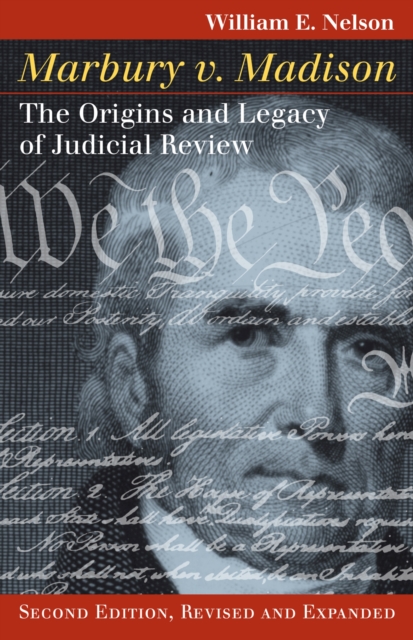Marbury V. Madison: The Origins and Legacy of Judicial Review

Marbury V. Madison: The Origins and Legacy of Judicial Review
On the surface, the case itself seems a minor one at best. William Marbury, a last-minute judicial appointee of outgoing Federalist president John Adams, demanded redress from the Supreme Court when his commission was not delivered. But Chief Justice John Marshall could clearly see the danger his demand posed for a weak court filled with Federalist judges. Wary of the Court's standing with the new Republican administration of Thomas Jefferson, Marshall hit upon a solution that was both principled and pragmatic. He determined that while Marbury was justified in his suit, the law on which his claim was based was in conflict with the Constitution. It was the first time that the Court struck down an act of Congress as unconstitutional, thus establishing the doctrine of judicial review that designates the Court as chief interpreter of the Constitution.
Nelson relates the story behind Marbury and explains why it is a foundational case for understanding the Supreme Court. He reveals how Marshall deftly avoided a dangerous political confrontation between the executive and judicial branches by upholding the rule of law. Nelson also shows how Marshall managed to shore up the Court's prestige and power rather than have it serve partisan political agendas.
Nelson expands upon his original historical analysis by providing a more complete and nuanced account of eighteenth-century constitutionalism and the early development of judicial review. The new material includes chapters on nullification of legislation in local courts, James Otis's articulation of the doctrine of judicial review in the Writs of Assistance Case, the use of this doctrine in response to the Stamp Act and Townshend Act, and the expansion of judicial review in the State Cases. This revised and expanded edition provides a fuller picture of colonial America and a richer understanding of Marshall's foundational decision.
PRP: 136.09 Lei
Acesta este Prețul Recomandat de Producător. Prețul de vânzare al produsului este afișat mai jos.
122.48Lei
122.48Lei
136.09 LeiLivrare in 2-4 saptamani
Descrierea produsului
On the surface, the case itself seems a minor one at best. William Marbury, a last-minute judicial appointee of outgoing Federalist president John Adams, demanded redress from the Supreme Court when his commission was not delivered. But Chief Justice John Marshall could clearly see the danger his demand posed for a weak court filled with Federalist judges. Wary of the Court's standing with the new Republican administration of Thomas Jefferson, Marshall hit upon a solution that was both principled and pragmatic. He determined that while Marbury was justified in his suit, the law on which his claim was based was in conflict with the Constitution. It was the first time that the Court struck down an act of Congress as unconstitutional, thus establishing the doctrine of judicial review that designates the Court as chief interpreter of the Constitution.
Nelson relates the story behind Marbury and explains why it is a foundational case for understanding the Supreme Court. He reveals how Marshall deftly avoided a dangerous political confrontation between the executive and judicial branches by upholding the rule of law. Nelson also shows how Marshall managed to shore up the Court's prestige and power rather than have it serve partisan political agendas.
Nelson expands upon his original historical analysis by providing a more complete and nuanced account of eighteenth-century constitutionalism and the early development of judicial review. The new material includes chapters on nullification of legislation in local courts, James Otis's articulation of the doctrine of judicial review in the Writs of Assistance Case, the use of this doctrine in response to the Stamp Act and Townshend Act, and the expansion of judicial review in the State Cases. This revised and expanded edition provides a fuller picture of colonial America and a richer understanding of Marshall's foundational decision.
Detaliile produsului










